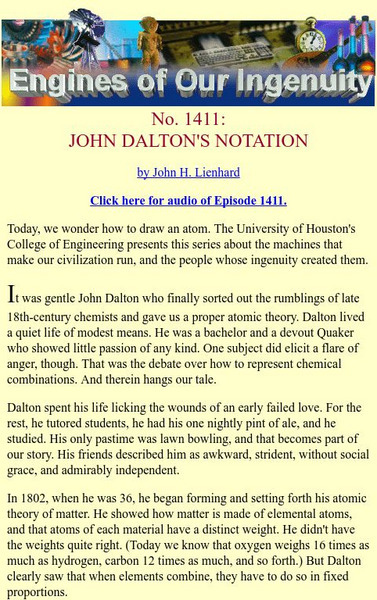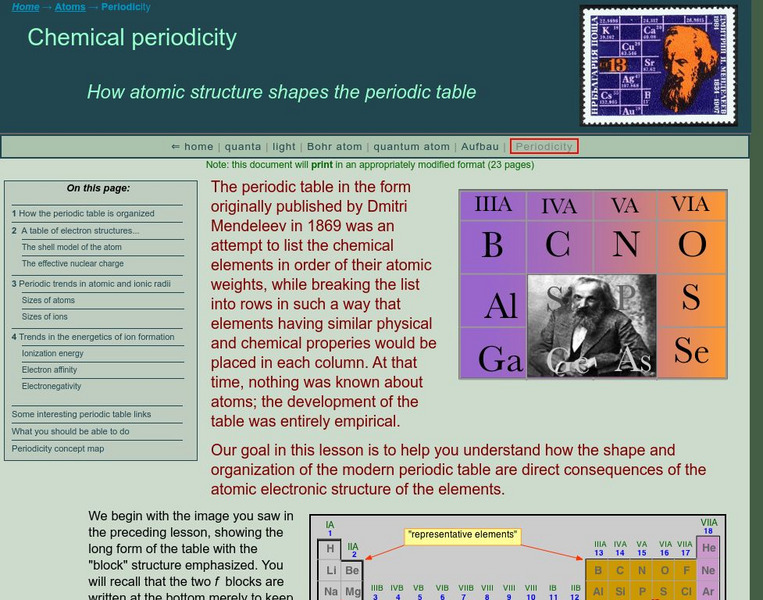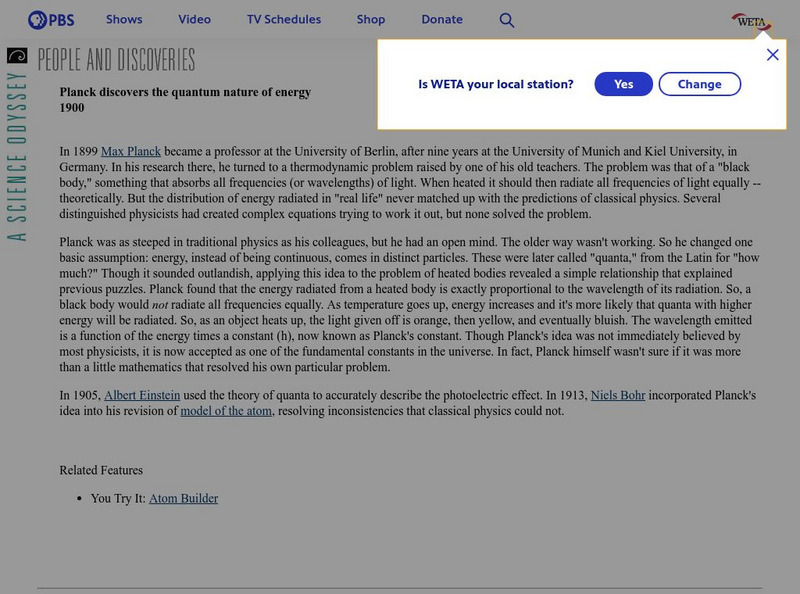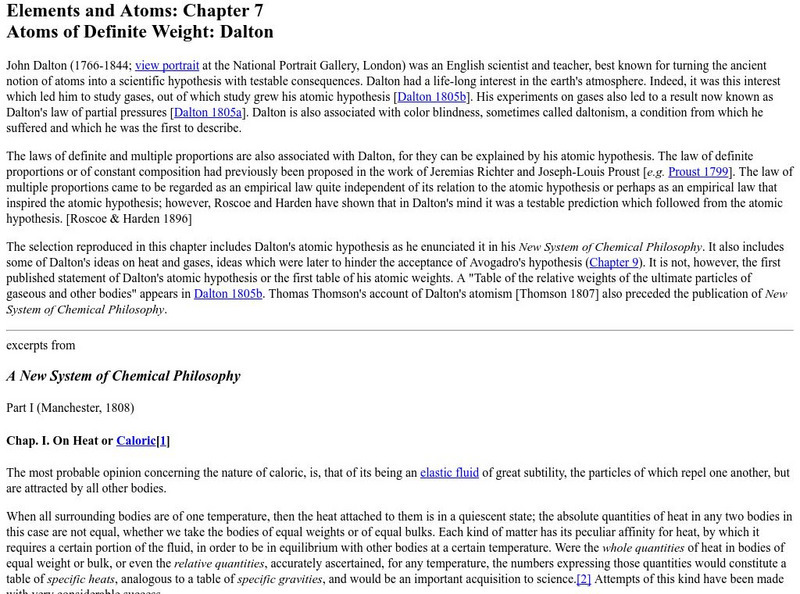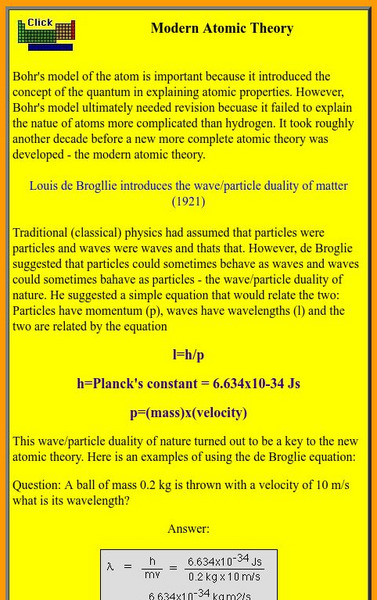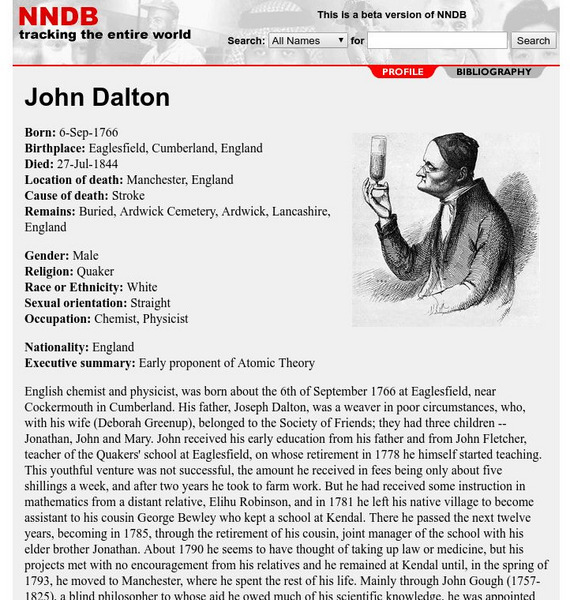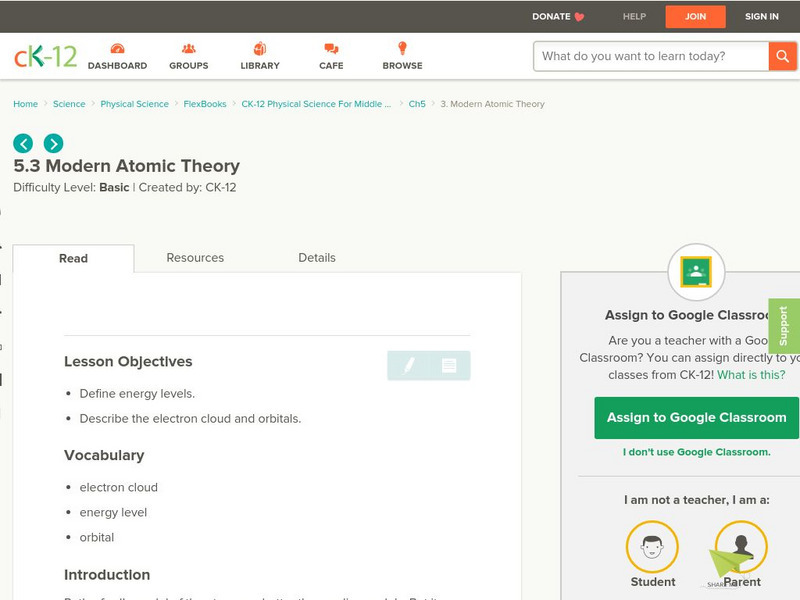Wolfram Research
Wolfram Science World: Albert Einstein (1879 1955)
This site about Albert Einstein examines many of his theories. It also includes a list of Einstein quotes and references.
University of Houston
University of Houston: Engines of Our Ingenuity: John Dalton's Notation
This is part of a small radio show at the University of Houston. It talks about how John Dalton came up with his version of chemical notation, and how it differs from our version of it today. It is available in audio form also.
Simon Fraser University
Chem1 Virtual Textbook: The Quantum Atom
Acting as a subtopic of the General Chemistry Virtual Textbook's section on Atoms and the Periodic Table, this site specifically addresses the quantum atom and related topics. The related topics include the wave function and its physical...
Simon Fraser University
Chem1 Virtual Textbook: The Shell Model of the Atom
Acting as a subtopic of the General Chemistry Virtual Textbook's section on Atoms and the Periodic Table, this site discusses the properties of the atoms individually in relation to the main group elements of the Periodic Table.
Crescent Public Schools
The Internet Science Room: The Periodic Table and Atomic Theory of Matter
A chemistry tutorial highlighting historical development of the atomic theory of matter and the periodic table of elements.
Crescent Public Schools
The Internet Science Room: Quantum Numbers
Using diagrams, illustrated examples, and student practice this chemistry class tutorial explains quantum numbers.
Math Science Nucleus
I. Science Ma Te: Integrating Science, Math and Technology
This site offers a wealth of online textbook-related materials that encourage the discovery of science in the world around us. Enter the site to access material on specific topics. Each section contains reading material (complete with...
TED Talks
Ted: Ted Ed: The 2400 Year Search for the Atom
How do we know what matter is made of? The quest for the atom has been a long one, beginning 2,400 years ago with the work of a Greek philosopher and later continued by a Quaker and a few Nobel Prize-winning scientists. Theresa Doud...
PBS
Science Odyssey: Heisenberg States Uncertainty Principle
Explains the Heisenberg Uncertainty Principle, that it is impossible to know both the momentum and position of an electron, along with describing the impact that it made upon the scientific community upon its introduction in 1927.
Wikimedia
Wikipedia: Max Planck
Discover the life and accomplishments of the great German scientist Max Planck. This site also provides links to sites explaining theories and scientific terms that are associated with Planck.
Wikimedia
Wikipedia: Werner Heisenberg
In this Spanish-language entry, trace the life and accomplishments of Werner Heisenberg, the great physicist whose work with quantum mechanics resulted in earning the Nobel Prize.
PBS
Pbs: Planck Discovers the Quantum Nature of Energy
PBS offers a short summary of the discovery of the quantum nature of the atom by Max Planck. Easy to follow.
Other
Le Moyne University: John Dalton
This site from the Le Moyne University provides excerpts from Dalton's "A New System of Chemical Philosophy" published in 1808. Includes Dalton's table of atomic weights and and scanned atomic symbols.
Other
Iun: Modern Atomic Theory
This is an excellent site with information on the discovery of the atom and the different models. Includes a sample question and answer using Planck's constant.
Soylent Communications
John Dalton
A very thorough biography of John Dalton on this site made by Notable Names Database. Also gives the names of books that were written about him or his ideas.
State University of New York
State University of New York: Binding Energy
This simulation allows students to understand relative binding energy.
Sophia Learning
Sophia: Ernest Rutherford: Lesson 2
This lesson explains Rutherford's gold foil experiment and the discovery of the nucleus. It is 2 of 3 in the series titled "Ernest Rutherford."
CK-12 Foundation
Ck 12: Modern Atomic Theory
[Free Registration/Login may be required to access all resource tools.] Rutherford's model of the atom was better than earlier models. But it wasn't the last word. Danish physicist Niels Bohr created a more accurate and useful model....
University of Wisconsin
The Why Files: Learning About Neutrinos
A learning resource to understand what neutrinos are and their importance to science.
Famous Scientists
Famous Scientists: Albert Einstein
Read a short biography about Albert Einstein, and find out how he discovered the general theory of relativity.
Famous Scientists
Famous Scientists: John Dalton
Learn about the discoveries and life of John Dalton in this article.
Famous Scientists
Famous Scientists: Wolfgang Ernst Pauli
Learn about the life and work of one of the pioneers of quantum physics, Wolfgang Ernst Pauli.
CK-12 Foundation
Ck 12: Chemistry: Democritus' Idea of the Atom
[Free Registration/Login may be required to access all resource tools.] Explains the ideas of Democritus dealing with the divisibility of the atom.
Nobel Media AB
The Nobel Prize: Max Planck Biographical
A biography of Max Planck, covering his research interests and contributions to science, as well as more personal information about his family and life.



